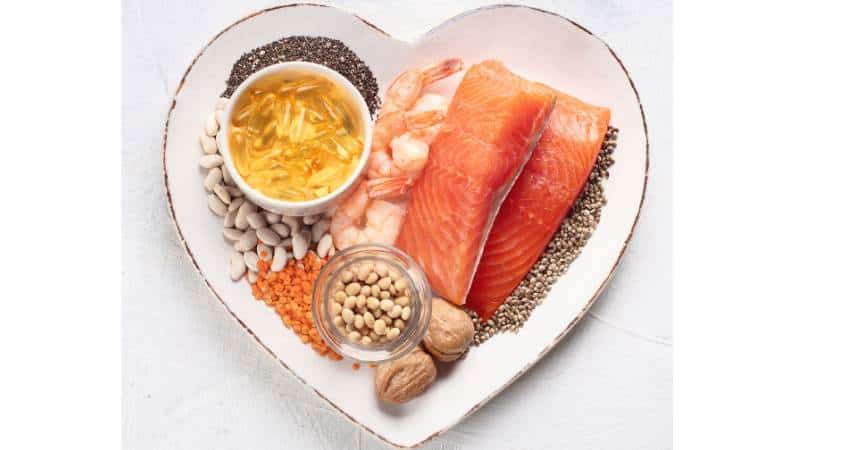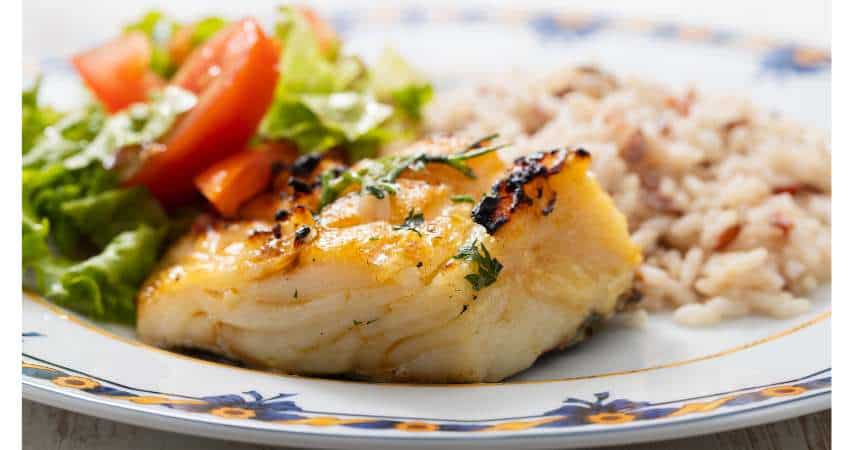Cod vs Chicken: Which is Healthier? Let’s Compare Every Part
Cod and chicken are two popular types of meat, but many people don’t know which one is healthier to eat. Therefore, which is healthier, cod or chicken?
Cod is healthier than chicken due to its higher percentage of heart healthy omega-3 fatty acids and minerals. Cod contains less calories and fats per serving than chicken. Cod provides more B12, potassium, magnesium, calcium and selenium than chicken.
The article will break down each nutrient and compare them side-by-side. The comparison includes the different parts of the chicken like the wings, thighs, drumsticks and breasts. I’ll examine why one is healthier and their mercury levels.
As a Certified Health Coach, many of my clients ask me about healthy meats. In addition to coaching clients about chicken and cod, I’ve purchased, researched and consumed both for over 30 years.

Nutrition Comparison: Cod vs Chicken
The following table compares the nutrients per four ounces, white meat and skinless.
| Nutrient | Cod, raw Skinless (4 Ounces) | Chicken Breast, raw Skinless (4 Ounces) |
| Calories | 93 | 136 |
| Fat | 0.8 g | 3 g |
| Protein | 23 g | 26 g |
| Omega-3 | 0.22 g | 0.02 g |
| B-6 | 0.2 mg | 0.9 mg |
| B-12 | 1.0 mcg | 0.2 mcg |
| Thiamin | 0.08 mg | 0.10 mg |
| Riboflavin | 0.07 mg | 0.20 mg |
| B5 | 0.1 mg | 1.6 mg |
| Iron | 0.4 mg | 0.4 mg |
| Niacin | 2.3 mg | 10.8 mg |
| Folate | 7.9 mcg | 10.21 mcg |
| Potassium | 468 mg | 378 mg |
| Magnesium | 36 mg | 31 mg |
| Phosphorus | 230 mg | 241 mg |
| Calcium | 18.1 mg | 5.6 mg |
| Zinc | 0.5 mg | 0.7 mg |
| Selenium | 37.5 mcg | 25.9 mcg |
Nutrition Sources ((Nutrition Value: Fish, raw, Atlantic, cod)) ((Nutrition Value: Chicken, raw, meat only, boneless, skinless, breast, broiler or fryers))1
When examining the table above, remember the chicken listed is white meat and not the dark part of the chicken or with the skin. A skinless chicken breast is considered the healthiest part of the chicken. Let’s determine which one is better.
Cod is better than chicken breast due to its higher percentage of heart healthy omega-3 fatty acids, less fat and more minerals. Cod provides more B12, potassium, magnesium, calcium and selenium.
Even though, skinless chicken breast is healthy too. It contains a wide variety of vitamins, minerals and protein. It provides more protein, B6, thiamin, riboflavin, B5, niacin, folate, phosphorus and zinc.
It’s the omega-3 fatty acids which separate the two and make the fish a little more healthier. The benefit section down further explains why omega-3s are important.
Chicken Parts and Their Nutrition Values
Chicken is one of the most popular types of meat, and it is healthy to eat when skinless and cooked without unhealthy additions. The skinless chicken breast is the healthiest part of the whole chicken2.
However, there are four different cuts, and the nutritional content of chicken can vary depending on the part. Let’s compare which one is the leaner choice.
Cod is leaner than chicken due to its less total fat and fewer calories. It contains less total fat than any part of the chicken. The fish contains 0.8 grams of fat per four ounces, chicken breast 3 grams, thighs 4.7 grams, drumsticks 4.2 grams and wings 4 grams.
Before adding seasonings like butter or other ingredients to your dish, inspect the nutrition facts of an unseasoned, skinless and cooked cut.
Adding butter, certain seasonings and other foods to a whole roasted chicken will add calories, carbs or other things, like saturated fat, you may be trying to avoid.
The table below compares the nutrients of the remaining parts of the chicken to cod.
| Nutrient | Chicken thigh Skinless, raw 4 ounces |
Chicken drumstick Skinless, raw 4 ounces |
Chicken wings, Skinless, raw 4 ounces |
Cod Skinless, raw 4 ounces |
| Calories | 137 | 131 | 143 | 93 |
| Fat | 4.7 g | 4.2 g | 4 g | 0.8 g |
| Protein | 22 g | 22 g | 25 g | 23 g |
| Omega-3 | 0.05 g | 0.05 g | 0.10 g | 0.22 g |
| B-6 | 0.5 mg | 0.4 mg | 0.6 mg | 0.2 mg |
| B-12 | 0.6 mcg | 0.5 mcg | 0.4 mg | 1.0 mcg |
| Thiamin | 0.09 mg | 0.10 mg | 0.06 mg | 0.08 mg |
| Riboflavin | 0.22 mg | 0.24 mg | 0.11 mg | 0.07 mg |
| B5 | 1.2 mg | 1.2 mg | 0.94 mg | 0.1 mg |
| Iron | 0.9 mg | 0.8 mg | 1.0 mg | 0.4 mg |
| Niacin | 6.2 mg | 5.8 mg | 8.3 mg | 2.3 mg |
| Folate | 4.5 mcg | 4.5 mcg | 4.5 mcg | 7.9 mcg |
| Potassium | 273 mg | 254 mg | 220 mg | 468 mg |
| Magnesium | 25 mg | 22 mg | 24 mg | 36 mg |
| Phosphorus | 209 mg | 196 mg | 175 mg | 230 mg |
| Calcium | 7.9 mg | 10.1 mg | 14.7 mg | 18.1 mg |
| Zinc | 1.7 mg | 2.3 mg | 1.8 mg | 0.5 mg |
| Selenium | 25.9 mg | 24.6 mg | 20.2 mcg | 37.5 mcg |
Examining the nutrients of the other parts of the chicken, you’ll see they are not as nutritious as the white chicken meat. Even more so, cod is healthier than the thigh, drumstick and wing.
Comparing the fish to the whole chicken, even skinless, strengthens the argument cod is healthier and better than the whole chicken.
Just like the chicken breast, the other parts do contain a wide variety of beneficial vitamins and minerals. Adding the skin would increase the amount of fat, particularly the unhealthy saturated fat.
Cod have significantly more vitamins E than chicken. Chicken contains more fat, saturated fat and monounsaturated fat.

Another article you should check out is Cod Alternatives: The 12 Best Substitutes. Try other fish for variety or when it is unavailable.
Health Benefits
Both of them contain many of the same nutrients and therefore similar health benefits. Even though, I broke down the benefits by which meat offers the higher percentage of each nutrient.
Cod Health Benefits
Omega 3 Fatty Acids
The fish provides 0.22 grams of omega-3 and the wings, 0.10 grams per four ounces raw, the most of any part. It contains over 100% more which leads to the question, why does omega-3 fatty acids matter so much?
It’s because omega-3 fatty acids are heart healthy and help keep arteries healthy. They accomplish this is by the following:
- Keeping bad cholesterol low.
- Keeping good cholesterol high.
- Reducing inflammation.
- Reducing plaque build-up.
- Lowering triglycerides
- Help keep the heart rhythms more normal.
DHA and EPA, two of the fatty acids, are associated with lowering blood pressure and improving the health of blood vessels ((National Center for Biotechnology: Marine Omega-3 Supplementation and Cardiovascular Disease)).
Studies suggest omega-3s can help reduce joint pain and stiffness in people with rheumatoid arthritis. They may also boost the effectiveness of anti-inflammatory drugs.
If you’re wondering how salmon compared in omega-3s check out my article, Salmon: Is One Better?

Magnesium
Adding magnesium to your diet could be instrumental in improving sleep related issues like insomnia.
Magnesium relaxes and calms the whole body including the blood vessels ((National Institutes of Health: Magnesium)). More so, it helps keep blood pressure levels balanced and stable. A recent study researched 22 studies and concluded magnesium supplementation decreased diastolic and systolic blood pressure6.
Magnesium helps control muscle and nerve function, blood sugar and blood pressure. In the muscles and heart, magnesium competes with calcium to help the muscles relax after contracting.
When the body is low in magnesium, calcium can over stimulate the heart muscle’s cells causing a rapid or irregular heartbeat.
Calcium
Both meats provide a good amount of calcium, the fish a little more. Like magnesium, calcium is important for blood pressure and the heart.
Harvard Health reports calcium helps maintain blood pressure because it helps to control the relaxing and tightening of blood vessels7. Calcium also helps the following:
- Build and maintains strong bones.
- Muscles need calcium to function properly.
- Improve nerve function.

Selenium
Not many people mention selenium when discussing nutrients. I’m unsure why because studies8 indicate selenium may help to protect the following:
- Heart disease
- Thyroid
- The immune system
- Cognitive issues
Chicken Health Benefits
B Vitamins
Of the seven B vitamins listed in the table above, chicken breast contained a higher percentage of six of them. The other parts also contain more.
The B vitamins in the table include B6, B12, B5, B1 (thiamin), B2 (riboflavin), B3 (niacin) and B9 (folate). B vitamins help support the following:
- Cardiovascular disease
- Red blood cells
- Brain function
- Nerve function
- Digestion
- Energy levels
Cod or Chicken? Which to Choose
This section will cover common goals people have and which one is better for that particular goal. Let’s start with the most popular, to lose weight.
Lose Weight
Cod is better than chicken for weight loss due to its less calories per serving. Raw cod contains 93 calories per four ounces. Skinless chicken breasts contain 136 calories, thighs 137 calories, drumsticks 131 calories and wings 143 calories.
The fish also contains less total fat than chicken.
Protein and Bodybuilding
Chicken breast and wings contain more protein per serving than cod. Cod contains more protein per serving than chicken thighs or drumsticks.
Skinless chicken breast is better for bodybuilding due to its higher percentage of protein and calories. The protein helps to build, repair and maintain muscle after workouts.
The few extra calories may help when bulking to add extra muscle weight.
Gluten Free
Both cod and chicken are naturally gluten free foods. However, be careful with popular breaded or floured coatings which typically contain wheat.
All types of fish are gluten free.
Cod, Fish and Chicken Mercury Levels
When discussing heath and the consumption of food, it’s difficult to ignore the mercury levels found in some fish. The Food and Drug Administration has issued warnings about consuming fish regarding their mercury levels ((FDA: Advice about Eating Fish)).
This is especially important for young, developing children and infants. In addition, pregnant women and those who are breastfeeding must be aware of their fish consumption.
Cod vs chicken, let’s examine their mercury levels.
Cod is not considered to have high levels of mercury compared to other seafood. The FDA lists it in the best choices for seafood regarding mercury levels. They recommend consuming cod safely up to 2-3 times per week.
Chicken is unknown to contain mercury9. Although a past report in 2006 found that some insects contain mercury and the animals that eat them, like chickens. The FDA hasn’t issued any known warnings about mercury in chicken.
If you’re interested in finding about how sea bass compared to other fish, check out my article, Sea Bass – Is One Better? Let’s Compare.
If you have any questions about the details in this article, other featured content or privacy policy, don’t hesitate to email us. You can find an email on our contact page. We’ll do our best to reply as soon as possible.
Read Next – More Cod and Fish vs Fish Articles!
Rainbow Trout vs Cod: Which Is Better? Let’s Compare
Cod vs Mahi mahi – What’s The Difference? Let’s Compare
Atlantic or Pacific Cod – What’s The Difference?
Blue Cod Vs Cod – A Complete Comparison
Black Cod Vs Cod – Is There A Difference?
Cod Vs Tilapia – A Complete Comparison
- USDA: Chicken Breast [↩]
- National Center for Biotechnology Information: Role of poultry meat in a balanced diet aimed at maintaining health and wellbeing: an Italian consensus document [↩]
- Nutrition Value: Chicken, raw, meat only, wing, broilers or fryers [↩]
- Nutrition Value: Chicken, raw, meat only, drumstick, dark meat, broilers or fryers [↩]
- Nutrition Value: Chicken, raw, meat only, thigh, dark meat, broilers or fryers [↩]
- National Center for Biotechnology Information: Effect of magnesium supplementation on blood pressure: a meta-analysis [↩]
- Harvard Health: Key minerals to help control blood pressure [↩]
- National Institutes of Health: Selenium [↩]
- NRDC: Mercury Guide [↩]
